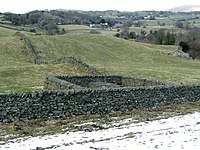Andy Goldsworthy !!!!!
British-born Andy Goldsworthy is famous for his site-specific, ephemeral work employing colourful flowers, leaves, mud ,twigs, snow, icicles and stones. most of the time Andy would use his bare hands or teeth maybe even saliva to prepare and build his pieces. Andy makes outdoor sculpture that manifests, a sympathetic contact with the natural world. when his work starts to disappear Andy would record his work with amazing colour photographs.

He deliberately explores the tension of working in the area where he finds his materials and is undeterred by changes in the weather which may melt a spectacular ice archer wash away a delicate structure of grasses. Andy's intention is not to make his mark on the landscape but rather to work with it instinctively, so that a delicate screen of bamboo or massive snow rings or a circle of leaves floating in a pool create a new perception and an ever-growing understanding of the land.
He deliberately explores the tension of working in the area where he finds his materials and is undeterred by changes in the weather which may melt a spectacular ice archer wash away a delicate structure of grasses. Andy's intention is not to make his mark on the landscape but rather to work with it instinctively, so that a delicate screen of bamboo or massive snow rings or a circle of leaves floating in a pool create a new perception and an ever-growing understanding of the land.
He has been quoted as saying, "I think it's incredibly brave to be working with flowers and leaves and petals. But I have to: I can't edit the materials I work with. My remit is to work with nature as a whole. Goldsworthy is generally considered the founder of modern rock balancing. For his ephemeral works, Goldsworthy often uses only his bare hands, teeth, and found tools to prepare and arrange the materials; however, for his permanent sculptures like "Roof", "Stone River" and "Three Cairns", "Moonlit Path" (Petworth, West Sussex, 2002) and "Chalk Stones" in the South Downs, near West Dean, West Sussex he has also employed the use of machine tools. To create "Roof", Goldsworthy worked with his assistant and five British dry-stone wallers, who were used to make sure the structure could withstand time and nature.
IMAGES DATES TITLE LOCATION
 | 1996–2003 | Sheepfolds | Cumbria, England, UK |
 | 1997 | Stone House | Herring Island, Victoria, Australia |
 | 1997 | Cairn | Herring Island, Victoria, Australia |
1998 | Hutton Roof | National Museum of Scotland Edinburgh, Scotland, UK | |
| 22 May – 15 November 2000 | Andy Goldsworthy at Storm King Art Centre (featuring the installation Storm King Wall) | Storm King Art Centre Mountainville, Cornwall, New York, USA | |
| August 2001 | Stone River[12] | Cantor Arts Centre, Stanford University Stanford, California, USA | |
 | 2002 | Andy Goldsworthy Arch at Goodwood[13] | Cass Sculpture Foundation Goodwood, West Sussex, England, UK |
 | 2002 | Chalk Stones Trail | South Downs near West Dean, West Sussex |
| 4 May – 31 October 2004 | Andy Goldsworthy on the Roof (featuring the installation Stone Houses) | Iris and B. Gerald Cantor Metropolitan Museum of Art Roof Garden New York City, USA | |
| 2005 | Andy Goldsworthy: Early Works A national touring exhibition from the Haywood Gallery | England, United Kingdom | |
| 2005 | Drawn Stone | M. H. de Young Memorial Museum San Francisco | |
  | 22 January – 15 May 2005 | The Andy Goldsworthy Project (including the installation Roof) | National Gallery of Art National Mall, Washington, D.C., USA |
| 2006 | Red sandstone wall at the Doerr-Hosier Center | Aspen Institute Aspen, Colorado, USA | |
 | 31 March 2007 – 6 January 2008 | Andy Goldsworthy | Yorkshire Sculpture Park West Bretton, Wakefield, West Yorkshire, England, UK |
| October 2008 | Spire | Park Presidio San Francisco | |
| June 2009 | Provence art trail | Provence France | |
 | 7 September 2012 – 2 November 2012 | Domo de Argila / Clay Dome | Cais do Porto Rio de Janeiro, Brazil |
Mr. Goldsworthy's work moves me deeply and brings a joyful lightness to my heart. His work's manifests artistic beauty expressed through his personal creativity in the raw materials of Nature at a fleeting moment in time.
ReplyDelete